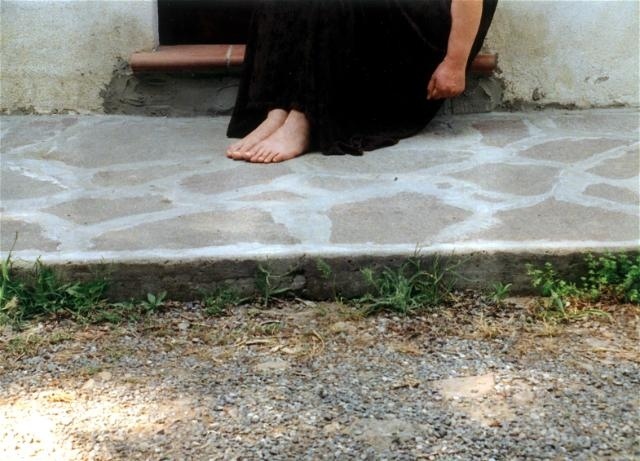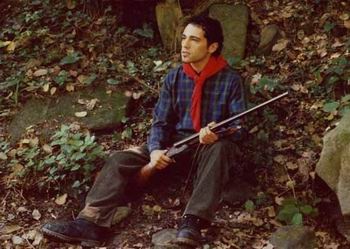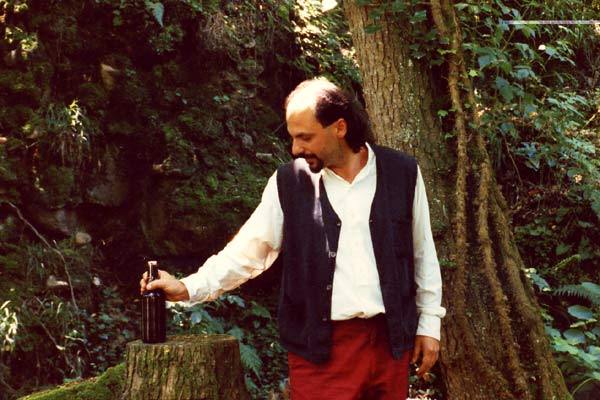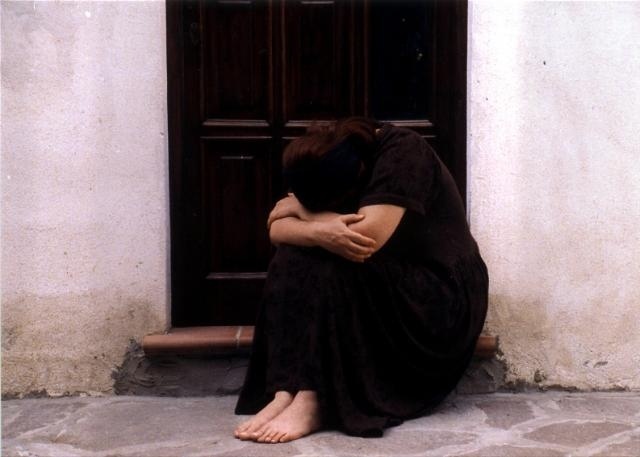
By Jacques Rancière
Originally published as ‘L’étrange tribunal’ in Le Monde diplomatique, april 2004.
Unlike anything else. The films of Danièle Huillet and Jean-Marie Straub are in many ways unique. Somehow, cinema is reinvented. Not only in form, admirably cut, composed of a singular play of actors and an incredible work of voices, but also and above all in substance. Because what Straub and Huillet propose, since almost thirty years, is a criticism “en règle” of capitalism. The most radical imaginable. And that encompasses, of course, the usual criticism of cinematic representation. It is thus not surprising that their films are often boycotted by the big festivals and the main distributors. This is also why it is indispensable to see them…
Jean-Marie Straub and Danièle Huillet’s diptych Le Retour du fils prodigue and Humiliés / Umiliati is based on Elio Vittorini’s novel Le donne di Messina, story of a short-lived community founded at the end of the second world war in Italy by people stemming from different regions. The intrigue of a book is never really of interest for Straub and Huillet. Their work is always about extracting its tensions – in the double sense of the word: confrontations of ways of thinking and differences in sensible intensity. From Le donne di Messina they’ve only kept two short extracts: in an earlier film based on the same novel, Operai, Contadini (2001), they used four chapters comprising of intertwined monologues in which the community of workers and farmers reveals itself in the argumentation of its quarrels and the affirmation of its sensible force.
While Le Retour du fils prodigue returns to this presentation of the community, Humiliés isolates the chapters in which it is brutally confronted with the outside’s economic and political laws; the finished war, the Republic and the persevering economic miracle.
The continuity seems to be unproblematic. It is nothing of the sort. The right-wing logic which sympathises with the utopias before sacrificing them to the dialectics of history is not shared by Straub-Huillet. What attracts them to Vittorini’s book, is the recognition of the same tension animating their cinema and their marxism – a tension that can be summed up with two names, Bertold Brecht and Friedrich Hölderlin: the artist who wanted to make theater using marxist dialectics in the most rigorous way; and the poet who was among the first to conceive this revolution of forms of the sensible world, of which marxist materialism resumed the idea in its own way.

Brecht and Hölderlin: on one side, the dialectic game of embodied thinking dismantling the mechanisms of domination and their impact on the dominated; on the other, the affirmation of the new sensible community and the risks for those venturing in its unknown. The art of Danièle Huillet and Jean-Marie Straub has always operated between these two poles, while at the same time demonstrating their secret relatedness.
At the time of History lessons (1972), they put the emphasis on the cynicism of Roman senators, construing either the “affairs of mister Julius Caesar” in the comfort of their garden, or the law of profit, triumphant in a time of war exploits and palace revolutions. It is still a lesson on political economy which, in Umiliati, is thrown in the face of the artisans of the community by the delegates of the new Italy. But the meaning of the history lesson as dispositif of voices enouncing it and bodies receiving it has changed.
Operai, contadini even seemed to rule out all lessons. The community was discarded from the logic which provides every story with its end and beautiful dreams with a sad ending. The numerous quarrels instructed by the protagonists – workers / farmers, bosses / masses, men / women, deserters and loyals – coalesced in the same fundamental tone, in the lyricism of a speech which stated, in the grandest language, the force of the constructors of the new world, materialized in the taste and the smell of a heather fire, the cooking of ricotta or an excursion in search for laurel leaves. The community didn’t have an end, only sensible moments, for ever present. Oftentimes leaning over to read the notebooks containing their lines, the protagonists regularly raised themselves to affront an imaginary spectator, designated in the text with an ironic interrogative: “the investigator, the judge, God?”.
Not an end of a journey, not a tribunal or history’s devices. In the face of the absent judge, the figure of the woman of the people, embodied by Angela Nugara – the same actrice who played in Sicilia! (1998) – affirmed with the diction of tragediennes the collective capacity or the possession of “a life of one’s own”. However, of the twelve protagonists in Operai, contadini, only she does not appear in Umiliati: she is replaced by an old farmer who only intervenes with the gesture of a hand demanding speech which is not granted. This disappearance is symbolic, just as a music of the apocalypse, borrowed from Varèse, comes to substitute a chant of hope, a Bach cantate.

The perspective has brutally changed. Here, the present of the community has an ending. The tribunal of history takes place, not so much to pass judgement than to humiliate the men and women of the community. Standing on a hillock, in the light, in their soiled clothes, their eyes often lowered, their hands sometimes behind their back, they find themselves submitted to the crossfire of the judges, situated beneath them in the freshness of the ravine and the certainty of their reasoning.
No more notebooks. The prosecutor and the three judges know their lesson – of economy and history – in its two versions: bourgeois (laws of property called to mind by a non identified character) and proletarian (laws of history made explicit by three partisans in red scarfs). Opposite – if we can say so, because no shot puts the two parties together: on the contrary, the absence of common space is accentuated – the words and gestures of the members of the community seem to be reduced to ruptions of anger and gestures of impotence.
Nevertheless, it is a peculiar tribunal. “Who are you?”, the “prosecutor” is asked. Question without answer. In Vittorini’s book, this “Charles the Bald”, armed with a surveyor’s yardstick, appeared as a enigmatic manipulator. Here he is only a voice animating a body: an almost ventriloquist voice in accordance with a frenzied look. What is passed through this voice, at the same time assured and laborious, as if astounded by what it says, is the law without age of property: terrains and houses, land and water, seas and volcanos, all that, it says, makes up a seamless framework where everything is appropriated: what doesn’t belong to Caïo belongs to Tizio, and what doesn’t belong to either of them belongs to the public administration.

There is no place on the land registry where communities like this one can settle. But the monologue resonates more like a chant of mourning than as an indictment. As the strange prosecutor’s speech brings about these rivers and craters all belonging to a master, his voice seems to radiate. It is as if the impersonal voice devides itself in two, as if the discourse of Vittorini’s sly manipulator has been secretly tainted with the voice of a poet, that of a Hölderlin maladroitly woken up from his sleep and assessing what has become of his world and his dream.
The voice of the partisans (“hunters” in Vittorini’s book) lacks the state of mind to explain the people of the village what their community is: a cooperative like all others if it wasn’t for the restrictions of its operations, the obsoleteness of its material and its ridiculous productivity. The scansions strongly articulated in the text, organized in rhythmic sequences by Danièle Huillet, at the same time playing with these Hölderlinian “antirhytmical suspensions” offered by the upward motion of accents in the Italian language, take another function here. In the frenzied monologue of the “prosecutor”, they contribute to the abstraction of a world. In the assured rhetorics of the red scarfs, they open up the wound with the knife of irony. If Charles the Bald states the law without age of space, they are the mouthpieces of time, the youth of the world. They can gleefully return the bullet of the dialectical game without having to look at those they are talking to, and who are like those behind their backs, those who have to chase the “train of history” on foot. They know the Republic, the law of the market and the boogie-woogie. In short, they are good Brechtians.
This Brechtianism is definitely not that of the filmmakers. The hunters will leave with the train of history, without having found the man they were looking for, but having reached another goal: disrupting the community. The Straubs, they stay behind, on foot, observing that the train has passed and refusing to comply. The stretched hand of the old farmer does not yield. In the last shot, Siracusa, the companion of the chief who has “nothing left to say” to the deserters, rests on the doorstep of the closed house, her head in her arms, in the pose of Boticelli’s Derelitta. But with a last cry, an “Ah, yes!” passing from resignation to ultimate affirmation, her arms loosens, while the camera slides down in a last movement which frames, up until the height of her naked feet, the dangling arm which the fist remains firmly closed.
——————————————————————————————————————————————————————-
Translated by Stoffel Debuysere (Please contact me if you can improve the translations).
In the context of the research project “Figures of Dissent (Cinema of Politics, Politics of Cinema)”
KASK / School of Arts